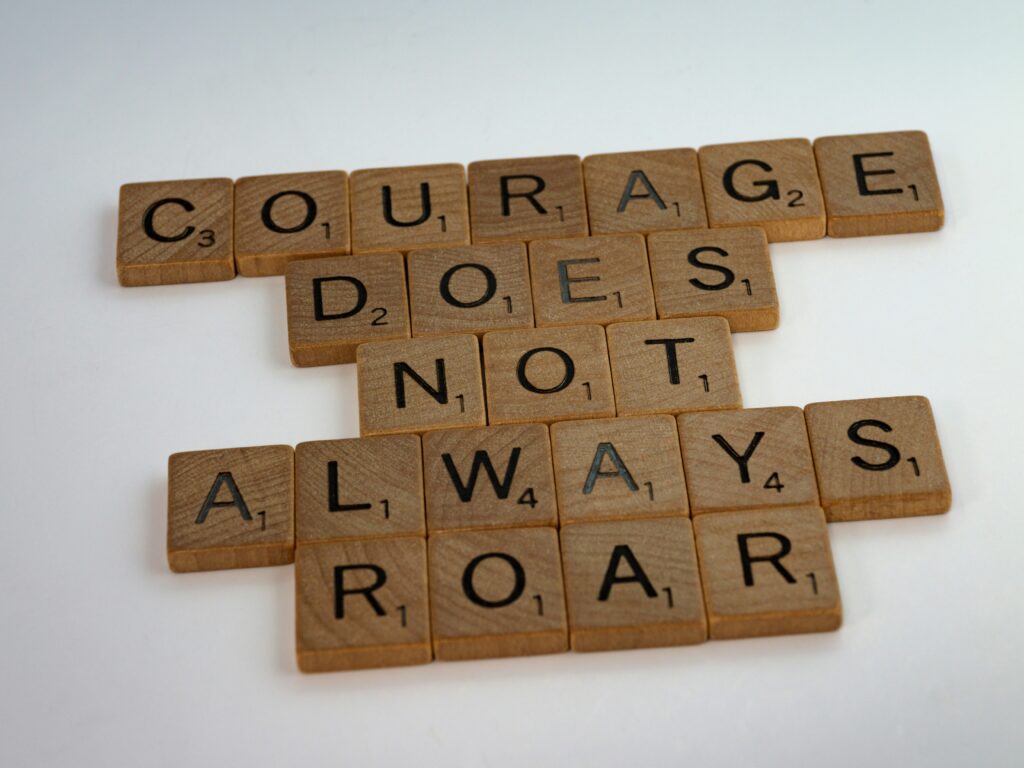
Deciding to heal from betrayal trauma and what to do about your relationship with the sex addict takes a great deal of courage. Yet, we often fail to recognize the importance of courage in our healing process. Oxford Languages defines courage as “the ability to do something that frightens one, strength in the face of pain or grief”. Seeking healing can be frightening because we don’t know if we will heal, we don’t know if we will arrive at the perfect solution, or if we should even hope for one.
Courage to heal
For me, courage was that tiny thing inside of me that gave me just enough energy to take a step towards my healing, regardless of whether I felt like it or not. These steps didn’t mean I wasn’t in pain; I was actually experiencing a great deal of pain. However, I knew I had to seek healing before I could make other decisions about my marriage moving forward. It takes courage to leave; it takes courage to stay, and it takes courage to admit you don’t have a clue regarding what your next steps will be.
I make a point of stressing “having the courage to decide to heal” because some people don’t make that choice. Some partners stay stuck in pain, anger, and disbelief with no intention of healing, yet wonder why they are miserable, and nothing seems to change. They would rather hope for the best than do the “scary” work of healing from betrayal trauma.
Some partners don’t see the value of healing because the problem belongs to the addict, not the wounded. However, when we take an honest look at the damage caused by the addict, we can’t deny the need to heal our trauma. Ignoring this acknowledgment isn’t a step towards healing; it is a decision that will keep one stuck. We discover that healing isn’t about the addict; it’s about healing ourselves, whether we stay with the addict or not. It takes a great amount of courage to do the following in an attempt to heal from betrayal trauma:
- confiding in a close friend
- sharing our information with a pastor, priest, or faith leader
- attending a support group week after week, month after month, or year after year.
- reading books that focus on betrayal trauma (Who really wants to do that?)
- creating boundaries
- journaling
- working with an accountability partner
- attending workshops
- reading blogs
- listening to podcasts
- Requesting a disclosure when ready
- Finding a therapist who is skilled in working with partners of sex addicts whom you can trust.
Obviously, not everyone does all these actions, and I didn’t list everything. However, even taking one action towards your healing requires courage.
My favorite line in the Serenity Prayer is “courage to change the things I can.” I’ve held on to this line since the beginning of my journey because it helped me to focus on what I needed to change or adjust within myself, such as:
- changing my black and white thinking
- decreasing my rage and sarcasm
- expressing other emotions besides anger.
- Staying in my lane and giving others the respect to stay in theirs.
- Becoming a better listener
- Giving myself the grace to experience healing in an imperfect manner
- Changing my judgmental/critical attitude
The best part of this was that the results weren’t based on my husband’s sobriety. I could heal from the pain and control what I needed to because of how beneficial it was to me.
Once I found myself knee-deep in my healing, it didn’t take long to realize I was on a journey; this was not going to be a quick fix. At one point, I felt like my life revolved around betrayal trauma healing. I was seeing a therapist, attending two support groups, and reading everything I could regarding sex addiction and betrayal trauma. For a while, the healing equation also included couples therapy. I can’t tell you the number of times I asked myself, Is this really my life now? Although these activities felt like a pain at the time, I did them because the pain of my husband’s betrayals was worse, and I didn’t want to be stuck in that pain forever.
With time, I found enough courage to challenge myself on my healing journey beyond focusing on the pain I was experiencing. I had to create boundaries that I was prepared to follow through with if my husband broke them. Creating boundaries meant I had to ask myself what I was and wasn’t willing to accept moving forward. Additionally, it was also important for me to acknowledge what my life would be like if my husband and I didn’t stay together, which was a realistic outcome and still is.
In my opinion, betrayal trauma doesn’t magically erase pain, but it’s very uncommon for someone to do the work and not see a significant shift in their healing process. Taking action towards your healing is the first step of courage that ultimately guides you to the decisions you need to make about your future.
Courage to stay
I’m ashamed to admit I used to think weak people stayed with their sex addict because they had no self-esteem and didn’t love themselves. Well, I was very wrong. Most of the people I’ve met who are staying with their addict (at least for now) are far from weak or insecure. Many partners I’ve met say they want to give their sex addict time to see if he or she can maintain sobriety and make significant changes before deciding whether or not to stay. However, most partners I know aren’t running in place waiting on their addict to recover either; they are working on their own healing in the meantime.
Other judgments, such as the betrayed partner is staying because they have no choice or are afraid to leave, are usually not the case either. It may be the story for a few, but one of the things I remember hearing often in my journey was “You have choices”. Although we have been betrayed, that doesn’t mean we don’t have choices. Fortunately, the work involved in betrayal trauma healing can help a betrayed partner trust themselves more, giving them the courage to make choices for themselves that align with the future they desire. Personally, I found it very empowering to hear that I had choices consistently. Intellectually, I knew this already, but there was something about hearing it often and reading this in healing literature that eased my anxiety.
Choosing to stay with a sex addict is not an easy choice; it takes courage to do the following:
- Trust your sex addict again, or acknowledge you don’t fully trust your partner yet.
- explore different levels of intimacy with the addict, both sexual and emotional, when you are ready.
- to know when you should stay on your side of the street, acknowledging when you’ve crossed the line
- to be judged by others
- Trust yourself while in the relationship.
- Accept that the road ahead may still be bumpy.
- Heal as a couple
` Just because a couple is together while healing doesn’t mean they are in paradise. Betrayed partners still need to heal, and triggers still occur. Staying with the addict, whether he or she is sober or not, is a tough decision; not one for the weak.
Courage to leave
Leaving the sex addict can be difficult as well, and it’s not an “easy way out”. For many, leaving can impact finances, parenting, one’s faith, emotional well-being, social circles, and mental health. The sad part is that by the time there is a decision to leave, the partner is usually emotionally exhausted and still healing. Now the partner must use their energy for the logistics involved in leaving the addict, which can include legal matters. Despite the betrayed partner’s healing efforts, they now must grieve the reality of the relationship coming to an end.
The partner may have been in limbo for a while or held on tightly to the hope of sobriety for the addict to the point of depression. Perhaps the addict has been sober but still exhibits dry-drunk behavior. Whatever the reason, the relationship has ended, and now a new set of decisions and issues must be dealt with moving forward.
Furthermore, leaving a sex addict doesn’t mean you never loved the addict, you are unforgiving, or you didn’t try. These are some of the judgments partners may hear from others, or are the unhealthy stories they run in their minds, which can be extremely hurtful.
Some partners question their identity now that they are no longer in a relationship with the sex addict. Others find it difficult to even consider the possibility of dating because of the amount of damage to their ability to trust someone again.
Let’s not forget that it’s not as if the betrayed partner completely heals and then decides to leave the relationship. The partner is still healing from betrayal trauma while managing the logistics of ending the relationship. I’ve seen partners attend meetings and meet with a therapist after the relationship ends because they are still healing from the pain, have difficulty trusting others, or are working on issues within themselves that they believe contributed to the demise of the relationship, which they don’t want to carry with them into another one.
Even if a partner is happy about leaving the sex addict, that still doesn’t mean there aren’t issues to manage; it’s just a different set of concerns. Yes, you may not have to be concerned about your ex’s sobriety, but ending a relationship can mean a change of jobs, relocating, a change of friends, a change of where you worship, or a change in how people choose to interact with you. Furthermore, let’s not assume the betrayed partner is the only one who ends the relationship because we know that’s not always the case.
I’ve seen partners leave, and I’ve seen them stay; neither decision was made lightly. Most of the partners I’ve met will say it took a great amount of work, thought, tears, prayers, counsel, discussion with the addict, and other healing tools to reach a decision about their relationship. Furthermore, things change throughout the journey; some couples stay together but eventually part ways, or vice versa.
A quick note about those with children:
Whether you choose to stay or leave, letting your children (regardless of their age) see their parents working on themselves and heal from pain will be beneficial to them. Even if the children don’t exactly know what’s going on, seeing a parent get stronger and move forward is one of the best things parents can give a child, regardless of the relationship status. My children were able to see changes in my husband and me, which they articulated when they were older. They also knew when things were bad between us, despite our best efforts to keep things from them. However, having the courage to later discuss this with them as young adults has been beneficial for our entire family.
Whether partners stay or leave isn’t a pass to sidestep the pain of betrayal trauma. We all must decide what is best for ourselves regarding the relationship with the addict and dare to be comfortable with that decision while continuing to heal. Please give yourself some credit for having the courage it takes to be on this betrayal trauma healing journey. There are no guarantees, but we take one step at a time, trusting the process and using every bit of courage we have along the way.


